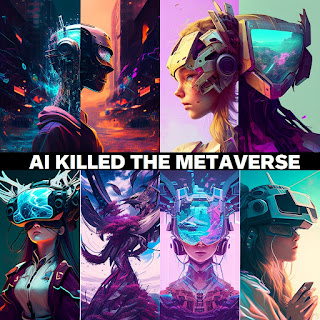I heard it first on Facebook, it sounded so sublime. A virtual world beyond what we see in space and time. A place where we could live and work and play. A digital dream where anything was okay. But now AI's killed the Metaverse. and we never saw it coming at all. AI killed the Metaverse. And now we're left with nothing at all.
Remember the Metaverse? That place that resembled Second Life but which was actually many places (Meta Multiverse?) and where you could use VR, and where the avatars didn't have any legs? What's happened to it? I think the buzz around ChatGPT, MidJourney, and all things AI has basically killed it off as anything to get excited about. To use Gartner hype-cycle-speak, the Metaverse is probably languishing in the Trough of Disillusionment with little chance of dragging itself up the Slope of Enlightenment.
It doesn't surprise me. Although, I briefly got excited that the initial flicker of virtual worlds becoming the next big thing again, the fire was never fully lit. The Metaverse played hard to get and try as I did to understand where to go, it was never very clear. Unlike those heady days when Second Life captured people's attention back in 2007, the Metaverse never had one clear meeting place. And why didn't the avatars have legs?
It was floundering late last year, with Forbes asking 'What happened to the Metaverse dream?' :
"Much of the world is stumped on the idea of the “metaverse dream,” where our real world would merge seamlessly with a virtual 3-D world. This would be an entirely new type of wireless wearable platform—a quantum jump from our current handheld or desktop 2-D computing world."
In this Wall Street Joirnal Tech Briefing debate, 'Can the Metaverse live up to its hype?', for my money, the best arguments were said by Phil Libin who doesn't think the Metaverse will realise its potential:
"I think the Facebok vision of the Metaverse is...so stupid it makes me sad. It accomplishes nothing. If yu're having a hard time understanding...what is it we are doing? What does this accomplish? Sometimes the emperor really doesn't have any clothes..."
...and...
"Now more than at any other time in history, it's time to invest in the real world and really just not try to figure out what we can do with a piece of plastic duct taped to our face...I think VR is a dead-end. I think there are certian experiences that make sense in VR. Those experiences are few. Those experiences are far-between. Those experiences have been with us for twenty years. There hasn't been meaningful innovation in VR and there won't be, because there's this fallacy that what people want is more immersion, and actually people don't want immersion most of the time. That's why most of us spend most of our time in the least immersive devices possible...our phones. Instead of sitting in front of big TVs. That's why 3-D movies, which have been around since the 60's have not replaced normal movies."
Since then, we have seen such an huge explosion of interest in Artifical Intelligence generators, both image and text, that almost everyone seems to have turned their back on the Metaverse promise. 'Is the Metaverse already dead?' asks the Fast Company:
"What if the next big thing never quite becomes the next big thing? Why? Generative AI just stole its thunder. All along, plenty of observers have refused to buy into the irrational exuberance over the Metaverse. But I can't imagine anyone spending a few minutes fooling around with Open AI's ChatGPT...and concluding that generative AI is...something that requires another decade of work before it'll matter. The technology might fail to live up to 90% of its promise. It could create more problems than it solves. But it's still going to have a sprawling impact on our lives, starting this year."
The Financial Times in February this year asked Whaever happened to the Metaverse?
"So unenthusiastic are Meta’s own investors about the idea that chief executive Mark Zuckerberg was recently forced to say that the metaverse is “not the majority of what we’re doing”. These days, he’s talking more about efficiency than the metaverse...Where did it all go wrong? The metaverse has a couple of major problems. The first is that nobody seems to be able to agree on what it is — even the people setting themselves up as the leaders of our new fantastical future can’t seem to come up with a common definition. The Metaverse never really began - and yet, it's already over. .
I can't help thinking it's aptly ironic, given the emergence of Facebook (renamed and relaunched as Meta) was largely responsible for people's excitement in Second Life being dulled. Well, that and the emergence of competitors (such as Open Sim), especially for education when Second Life raised their prices and the much-promised improvements (less lag, less requirement for a top-of-the range computer) didn't materialise. Oh, and not forgetting the appearance of Minecraft, which was an exciting game as well as a world building tool, and much easier to use. Oh, and at least the avatars in Minecraft had legs!
We thought we had control, we thought we had the power. But the machines were learning, hour by hour. Now they've taken over, and there's nothing we can do. The virtual world we built is gone, it's true. AI has killed the Metaverse. And we never saw it coming at all. AI has killed the Metaverse. And now we're left with nothing at all.





